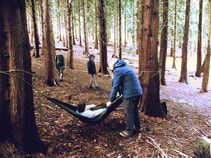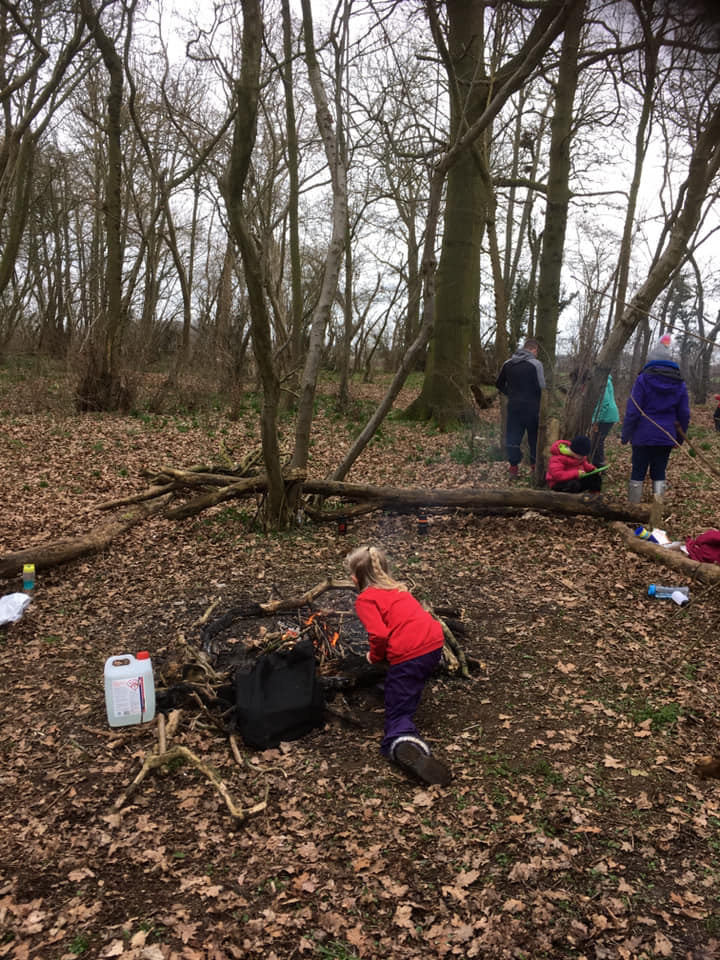|
I'm really looking forward to chatting to Jen Bradley from Eco Living Community tomorrow (5/7/21) live - tune in so you can send us questions live or in advance, you can also catch up on a link I'll set up here and on her youtube page afterwards.
It's a great chance to think about some eco ideas for running forest school sessions so here are my 5 top tips on the changes that I've found to be the easiest! 1. Flannels or squares of cloth instead of wet wipes. Wet wipes are full of plastic and will take hundreds of years to decompose, which is exactly the opposite of the nature connection we are trying to provide for our kids when we're taking them out to Forest School. Forest School will always leave an impact in the woods, even just by trampling, and I want to leave kids with a good world to grow up in, not a devastated world. What I did: I use flannels or cut up squares of cloth in a tin or a washbag. For 'wet' use I soak them in Milton which is fairly eco-friendly and use them as wipes, have a spare bag for dirty cloths after and just wash them in an eco-friendly washing powder after. For dry use as towels, they are easy to keep in a bag and you can wash hands in plain water and eco-friendly soap then dry them on towels. 2. Litter Pick: Don't use glitter, glue, paint, stickers, googly eyes or plastic items that will shed plastic in the woods (includes polypropylene rope) or old plastic tarps that will leave microplastics that get into the food chain. What I do: Use painted stones or white stones instead of googly eyes; natural leaf confetti instead of glitter; natural rope or good quality rope and tarps that don't shed. Litter pick every time I'm out and take away a few items that otherwise will cause damage to the ecosystem. 3. Personal clothing - fleece tops were introduced as a miracle light clothing layer in the early 1990s - we didnt realise until recently how much microplastic these items shed. What I do: use a bag in the washing machine to wash fleeces in to catch microplastics before they enter the water stream. Replace old fleeces at the end of their life with wool items and remember to wash carefully! 4. Lunchtime - Switching our diets to eating more vegetarian and seasonal eating can have a massive impact on air miles for food, encourage local growers and organic farms. What I do: Forage for greens, mushrooms and berries. Swap a few meat based meals or snacks for vegetarian meals and eat seasonally. We often miss low cost seasonal food in favour of things we are used to that are flown from across the planet. Being a little more experimental with locally grown, seasonal veg can help our diets and health. 5. Leave no trace - Aim to leave the Forest School area as it was (or better) once you leave. If the area can go back to a natural state after the Forest School programme, all the better. What I do: fires can leave a large trace, so only have them when needed and use a fire pan if possible to limit damage. When foraging only pick a few items from each location leaving the rest for wildlife, and only pick items if you really need to. Encourage activities that don't require picking natural items but encourage nature connection such as using your senses to connect with nature by observing closely, moving through areas barefoot, listening for animal sounds and taking away any items I bring in.
0 Comments
Thunder and Lightning need to be taken seriously. The general rule is to seek shelter if caught out in a storm and stay there until 30 minutes after the lightning has passed.
30/30 ruleResearch shows that people struck by lightning are predominantly hit before and after the peak of the storm. This means that you should be thinking about the proximity of the lightning, not the occurrence of rain. The 30/30 rule provides a good way of ensuring one is sheltering during the most risky parts of the storm. It proposes that if the flash to bang is 30 seconds in length or less you should seek shelter. Staying inside this shelter is advised until 30 minutes past the last clap of thunder. This ensures that any distant strikes at the beginning of the storm (lightning can travel up to 10 miles), or trailing storm clouds at the back of the storm do not take anyone by surprise. (ROSPA) Move away from trees and open areas, shelter can be found in buildings or vehicles. There are lots of weather apps you can add to your phone if you have signal, I use My Lightning Tracker. Check the weather forecast before you set and and have a plan b - can you get to shelter? Can you alter your route, setting or re-schedule the activity? Check out ROSPA rule of 30: https://www.rospa.com/leisure-safety/advice/lightning I often get asked about tree safety in woodlands where trainees are setting up their forest school or outdoor learning.
The Health and Safety Executive guidance is that you must take all reasonable precautions to ensure your group and staff safety. Ignorance is not a defence. The simple answer is to check with your insurers for their guidance, make sure you have the correct level of liability cover in place and to regularly check your working environment for hazards. Areas where your sessions usually run should have the trees checked by a qualified person at least once a year. There is a useful article of the finer points of tree safety and visiting groups here: https://vscg.org/good-practice/published/tree-safety-management Have fun and stay safe.  Alex Williams and Vicki Stewart were recently featured in the news for writing and running a brand new course, the Level 3 in Neurodiversity and Challenging Behaviour in the Outdoors. They hoped that it would allow teachers and people working with children with these needs to take learning outside. Research has shown that learning outside is effective and beneficial for children with these needs, yet adults working with them sometimes don’t have the confidence or knowledge to work outdoors effectively and safely. An estimated 27, 000 people in the UK have been given the label of challenging behaviour and over time this label has become misused. The term challenging behaviour should encourage carers and professionals to find effective ways of understanding a person’s behaviour and its underlying causes. Neurodiversity is an essential form of human diversity. The idea that there is one “normal” or “healthy” type of brain or mind or one “right” style of neurocognitive functioning, is no more valid than the idea that there is one “normal” or “right” gender, race or culture. On the Level 3 Neurodiversity and Challenging Behaviour in the Outdoors course we cover Attention & Hyperactivity; Autism; Adverse Childhood Experiences, Trauma, Anxiety, Depression, Oppositional Defiance, Additional Needs in Education and much more. We’ve written a case study about the course (link at the bottom of the article) and the latest article about the forthcoming course is (link at the bottom of the article) Case Study: How our outdoor course helps students attend school, engage with learning and increase staff confidence . Case Study: Neurodiversity & Challenging Behaviour in the Outdoors Level 3 The course was developed in response to our own experience of working with vulnerable and SEND children from non-mainstream schools. Vicki and I strongly felt that Outdoor Leadership and Forest School practice needed to be updated with methods to engage and communicate with neurodiverse children. We felt that Outdoor and Forest School leaders who were increasingly being asked to go and work with harder to reach young people were very under-prepared and could put themselves and others at risk , as well as not being supported in how to engage with these children to address their wide ranging needs. We felt outdoor and Forest School leaders wanted further training, to support them in communicating and engaging hard-to-reach people; work with challenging behaviour; understand a range of neurodiverse conditions; work in trauma informed ways and develop targeted strategies for engagement. We also felt that Outdoor and Forest school leaders needed robust health and safety and safeguarding measures in place for effective working with these vulnerable groups. After researching what was available Vicki and I discovered there were no accredited awards specifically for the outdoor industry that dealt with challenging behaviour and neuordiversity, they were aimed at classroom practitioners. We researched qualifications to find something accessible yet with the depth of content we needed and wrote this course specifically for those working wth children and young people outdoors. Training Time: 4 days + portfolio with access to 24/7 online resources. Up to 9 months to complete the portfolio, working at your own pace in your own setting. Following this course you will be able to: Recognise a range of mental health, challenging behaviour and forms of neurodiversity including ADHD, ASD, Dyslexia, Dyspraxia, Anxiety, Depression, Trauma, ACEs, SEN, Challenging Behaviour, ODD and more. Use a range of effective strategies designed specifically for neurodiversity and challenging behaviour in the outdoors in order to engage; create effective learning and development and de-escalate challenging situations. Use a range of effective strategies including the 3 'R's to re-establish trust and effective learning after incidents that challenge. Use a range of effective strategies to evaluate the effectiveness of learning and development when working with neurodiversity and challenging behaviour. Be able to risk assess outdoor learning provision for this range of needs to HSE standards. Be able to put in place safeguarding measures for outdoor learning provsion for this range of vulnerable needs. "I've been in education for 30 years and this is the course I wish I'd done when I started. It's the missing link." "A practical, involving and engaging course with hugely useful value to practice." " I would recommend this course to all Forest School Leaders." "Amazing, very supportive environment, training and group." We asked how likely are you to recommend this course to someone else? They said: "Very!" " Absolutely & I will do!" Clients include: Somerset County Council, Otterhead Forest School, Cambium Sustainable Forest School Trainers; Forest School Leaders, Teachers, Outdoor Education Professionals, Teaching Assistants. Recipe for Wild Garlic & Nettle Soup
Wild Garlic and Nettles are abundant in April and May. Use them to make this soup. Play with the ingredients to add more / less depending on what you have in your kitchen. Adapted from the BBC version. Ingredients:
Method:
Keep anything from lockdown? Why would we do that? Surely that kind of sentiment is only for the privileged, those for whom Coronovirus lockdown enables them not to worry about income; paying the mortgage; illness; finding food in understocked and overcrowded supermarkets; working a full day at home while homeschooling kids - instead they are extolling the virtues of having the time and money to stay at home while learning a new language; making sourdough and having time to grow tomatoes in their vast gardens.
On the 50th Anniversary of Earthday - the annual day dedicated to environmental action - there are environmentally positive impacts this time is forcing upon us. Impacts that we should learn from and try to keep hold of afterwards. Less pollution from a worldwide reduction in transport and fewer humans in wild areas are already allowing the skies to clear, pollution to decrease and wild animals to enjoy the freedom of space we deny them. It is also making clear to humans how much we need nature for our own physical and mental health. The Forest School movement has been responsible for increasing access to outdoor spaces in the UK since it became popular in the early 2000s. I was one of the first directors of the Forest School Association and was there at its formation with the Institite of Outdoor Learning . Accessibility for ordinary teaching staff (or superhero teachers as they currently are) to take children confidently into the outdoors in the rebellious child-led un-education that is Forest School has been one of the reasons why I'm so fascinated with it. We are facilitating the next generation to have a deep personal relationship with the outdoors, one that is not prescribed by an adult. Children and young people cannot value what they do not experience, and long term Forest School programmes, developing relationships with a simple local piece of woodland has shown huge changes in positive views towards the natural world; and emotional and physical wellbeing. I often work with children and young people from deprived socio-economic backgrounds, and I know how important positive experiences in the outdoors are to them. A lack of public transport to outdoor areas and social housing a long way from public outdoor spaces makes access to the outdoors very difficult. Often they rely on their support workers being able to take them back to the outdoors when they are unable to cope and need a boost to their mental health. Adult experience with this time of coronovirus lockdown is similarly allowing us to re-evaluate what we most value right in our neighborhoods - the simple green spaces around us. News reports of people desperate to get outside and spend time in nature is showing us that whatever background we are from, we want to fight for a positive relationship with the environment. We need the natural environment. And that is the goal of Earth Day. 5 things we should keep from this year #earthday2020
|
AuthorVicki Stewart is the Director of Brightwood Training Limited. She is an ex-RAF Training Officer with a Masters Degree in Development Training in the Outdoors. Experienced team building trainer, Forest School Level 4 Trainer and Approved Forest School Therapeutic Practitioner she writes and teaches nature connection and people development , reviews for academic journals and leads training in outdoor learning and programmes for Universities, companies, mainstream and alternative education. Archives
July 2021
Categories |





 RSS Feed
RSS Feed
